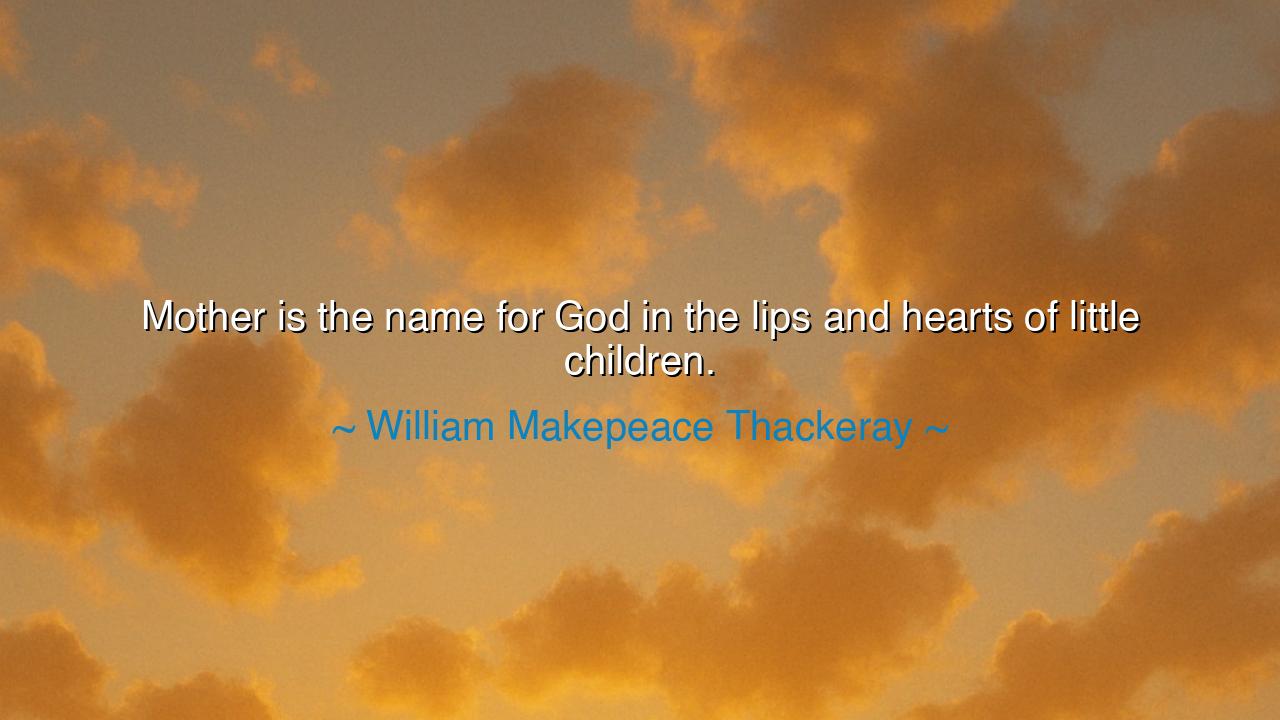
Mother is the name for God in the lips and hearts of little






The words of William Makepeace Thackeray, the Victorian novelist whose pen revealed both the frailty and nobility of the human heart, resound with tenderness and eternal truth: “Mother is the name for God in the lips and hearts of little children.” In this profound reflection, Thackeray captures the sacred mystery of motherhood — the way in which a child first encounters love, mercy, protection, and creation itself through the figure of the mother. Before a child learns the vastness of heaven or the theology of divinity, it experiences God in the arms that hold it, the voice that soothes it, and the presence that never fails.
The origin of this quote lies within Thackeray’s novel Vanity Fair (1848), a masterpiece that dissects the vanities and virtues of society with both irony and compassion. Amidst his critique of human ambition and pride, Thackeray often turned toward the redemptive power of love — particularly the love embodied by mothers. To him, the mother’s devotion was not a metaphor but a living sacrament, the purest image of divine care that humanity can witness. In a world marred by greed and betrayal, the mother remained the steadfast symbol of unconditional love — the one soul whose affection mirrored the grace of God.
At the heart of this wisdom is the recognition that the child’s first understanding of the divine is not theological but emotional. The mother’s gaze becomes the child’s first heaven; her embrace, its sanctuary. The word “mother” thus carries sacred weight, not merely for its biological significance but for its spiritual essence. To love a mother — or to be one — is to participate in the mystery of creation, to embody, in mortal form, the compassion and constancy that humankind attributes to the divine.
History and life itself overflow with examples of this truth. Consider Mary, the mother of Jesus, whose faith and quiet strength sustained her through joy and sorrow alike. In her love, she embodied patience, sacrifice, and grace — virtues that reflected divine nature in human form. Likewise, across centuries and cultures, countless mothers have carried their children through hunger, exile, illness, and despair, their love unbroken, their spirit unyielding. Each such mother, though unnamed, stands as a living image of God’s mercy, an earthly reflection of eternal love.
Thackeray’s words also carry emotional resonance because they remind us of something both tender and tragic — that the purity of a child’s love for its mother is a fleeting but sacred moment in human life. As we age, cynicism clouds the clarity of that vision, and few retain the child’s capacity to see holiness in human affection. Yet Thackeray calls us back to that state of purity, inviting us to remember that the divine often hides in the ordinary, and that the heart of a mother is perhaps the most radiant of all altars.
The lesson here is as practical as it is profound. Honor your mother, not merely out of duty, but as an act of spiritual reverence. Recognize in her love — or in the memory of it — the presence of something eternal. For those who have lost their mothers, remember that the love once given continues to live within you, shaping your conscience and your compassion. To act with kindness, to comfort others, to forgive — these are ways of continuing the divine work that your mother began.
Furthermore, Thackeray’s insight urges all who nurture — mothers, fathers, mentors, caregivers — to understand the holiness of their role. Every act of care, every sacrifice, every moment of patience echoes divine creation. The title “mother” transcends gender and biology; it speaks of the soul’s power to give life, sustain it, and bless it. To love in this way is to participate in the work of God Himself.
Thus, the words of William Makepeace Thackeray endure through time as both tribute and teaching: “Mother is the name for God in the lips and hearts of little children.” Let them remind us to revere the love that gave us life, to cherish the compassion that shaped our hearts, and to recognize the divine in the tenderness of human care. For in honoring the sacredness of a mother’s love, we draw nearer to understanding the heart of God Himself.






AAdministratorAdministrator
Welcome, honored guests. Please leave a comment, we will respond soon